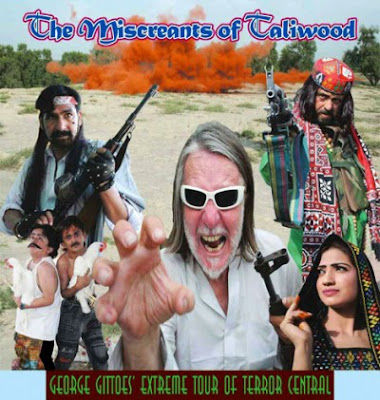Australia’s pick for Best Foreign Language Film for the 2019 Oscars and winner of the Best Independent Film Award from AACTA, the Australian Academy of Cinema and Television Arts, JIRGA, the new film by Benjamin Gilmour (shown below), despite its production history being about as fraught as they come, turns out to be -- if you can forgive one whopping bit of coincidence and unbelievability -- a remarkably unusual, thoughtful and finally very moving experience.
Why so fraught? Here's what the writer/director tells us in the press notes for his film:
“I was approached by a Pakistani producer who had found a Pashtun financier ready to put up $100K for the production of my script in Pakistan. My film was set in Afghanistan, but to benefit from the finance we'd need to shoot in Pakistan's Khyber Paktunkwha province. I approached Sam Smith, a talented actor from Sydney (not the singer) who was up for the adventure. We flew to Islamabad, only to discover the financier did not have permission to shoot from the ISI -- the Pakistan secret service -- who actively blocked the production after reading the script, considering it too politically sensitive. The Pashtun financier pulled his money out. Sam Smith and I were stranded in Pakistan with no team and no money and were now being tailed and harassed by the secret service. We could have flown back home then, but instead decided to shift the whole shoot to Afghanistan, risking our lives and investing some crowd funding and personal savings to make it…”
The result certainly proves worth everyone's time and finances (including ours, at least in terms of 78 minutes spent, together with the price of a movie ticket). This tale tells of an ex-soldier who committed an act somewhere between accident and war crime, and who has been hugely troubled by it ever since. He has determined to return to Afghanistan and the village/community where the event took place and offer himself up to "justice."
Smith's character Mike Wheeler's choice is certainly one of the more unusual ones, but the filmmaker and actor have collaborated well and made this choice strange but believable, thanks to a generally good script that shows both the difficulty of communication via language and the help that money (taped to our protagonist's body, above) can provide.
The leader of this group eventually bonds with Mike (thanks to the one fellow in the group who speaks enough English to communicate).
One wonders why the filmmaker did not dispense with the foolish "escape" and simply have the armed men at the road block be the group who captures Mike, keeping him in its underground lair until it eventually understands his mission and helps guide him toward it.
That said, the remainder of the film slowly coalesces into a very believable and moving conclusion involving that titular Jirga (below), as well as the family member (at bottom) of the dead Afghan man who unknowingly set Mike on his crazy but somehow understandable mission.
From Lightyear Entertainment, in English and Pashto (with English subtitles), Jirga opens this Friday, July 26, in New York City at the Village East Cinema, and in the Los Angeles area on August 2, at Laemmle's Music Hall 3. More playdates should be coming soon. Click here to view the most current schedule of cities and theaters.
























